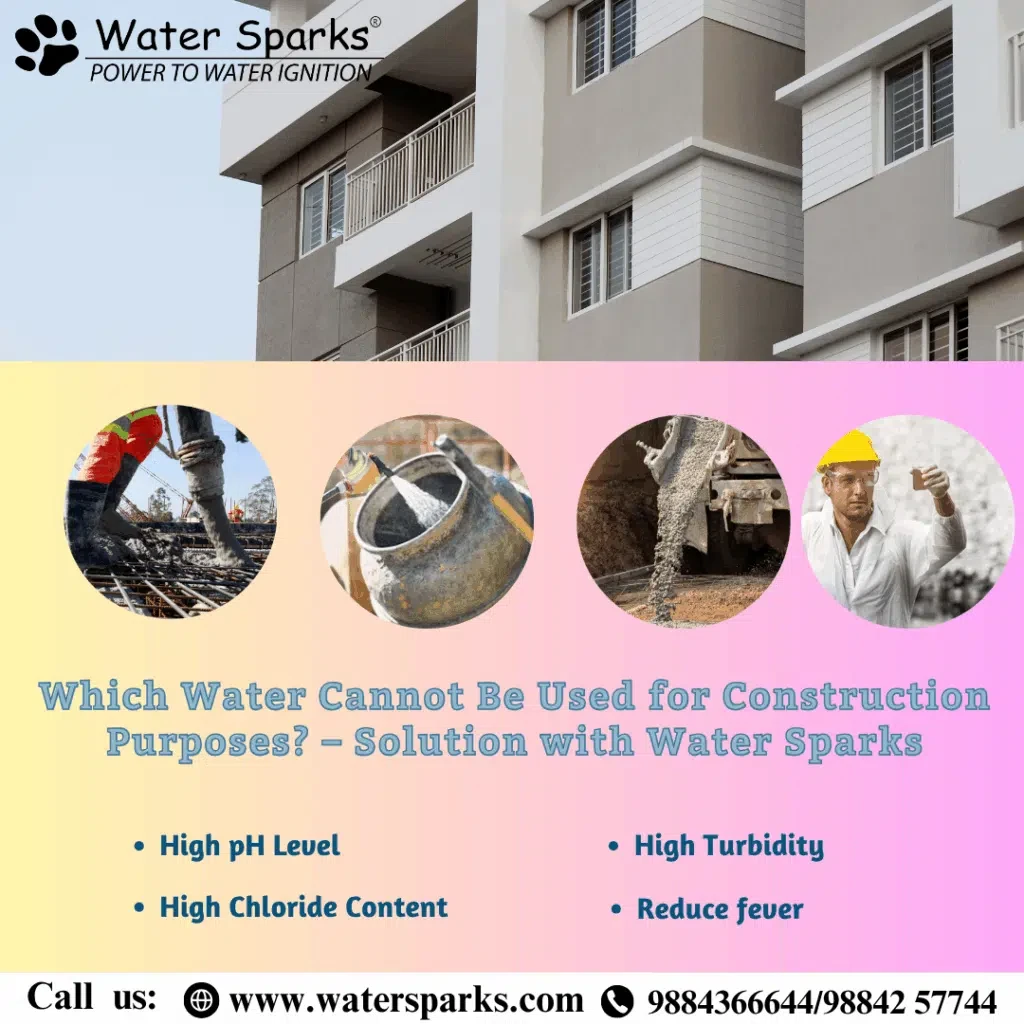Which Water Can Be Used for Construction Purposes? – Solution with Water Sparks
Water is a fundamental ingredient in construction activities, especially in concrete mixing, curing, and various masonry works. While it may seem like any water will do, the truth is more technical. Using unsuitable water in construction can weaken structural integrity, lead to chemical reactions that cause damage, and affect the longevity of the structure. So, which water can be used for construction? And how can innovative solutions like Water Sparks help?

Why Water Quality Matters in Construction Which Water Can be Used for Construction
Water in construction serves primarily to hydrate cement, aid in curing, and help in workability and mixing. However, Which water can be used for Construction the water must meet specific quality standards:
Hydration: For cement to properly bind and gain strength, it needs clean water free from contaminants.
Workability: Impurities can affect the consistency and setting time of concrete or mortar.
Durability: Salts and other chemicals in impure water can lead to corrosion of steel reinforcements and other long-term damages.
Hence, water quality is not just about cleanliness—it is about chemical composition, pH levels, salt content, and organic matter.
Characteristics of Suitable Construction Water
According to standards such as IS: 456-2000 (India) or ASTM C1602 (USA), Which water can be used for Construction water used in construction should adhere to the following:
1. pH Level
Should not be less than 6 and not more than 8.5.
Acidic or highly alkaline water can disrupt cement chemistry.
2. Total Dissolved Solids (TDS)
Less than 2000 ppm is ideal.
High TDS can reduce concrete strength and encourage corrosion.
3. Chlorides and Sulphates
Chloride content should not exceed 500 mg/l for reinforced concrete.
Sulphates should be under 1000 mg/l.
These salts can react with concrete and steel, reducing lifespan.
4. Organic Matter and Suspended Solids
Should be minimal.
Organic content can delay cement setting and reduce final strength.
5. Hardness
While some hardness is acceptable, very hard water (high in calcium or magnesium) can affect setting time.
6. Color and Odor
Water should be clear and free from foul odors.
Strong smells or discoloration indicate contamination.
Types of Water Typically Used
Tap Water / Potable Water
Ideal if tested and confirmed safe.
Often meets construction needs without treatment.
Groundwater (Borewell / Tube well)
Common in rural or semi-urban areas.
Needs testing for hardness, TDS, and chemical composition.
River or Pond Water
Often contains high organic material and silt.
Usually unsuitable without treatment.
Recycled or Treated Wastewater
Sustainable option if properly treated.
Must meet quality parameters to be used safely.
Common Water-Related Construction Problems
If unsuitable water is used, issues may include:
Cracks and scaling in concrete.
Corrosion of steel reinforcement.
Delayed setting or inconsistent curing.
Efflorescence, where salts emerge as white patches.
All of these compromise the safety and lifespan of buildings.
Why Contractors Should Prioritize Water Quality
Construction is no longer about just getting the job done. In the age of sustainability and smart cities, quality control is paramount. Which water can be used for Construction Using treated or tested water:
Reduces structural repair costs later.
Enhances durability of construction.
Demonstrates professionalism and commitment to standards.
Qualifies you for green building certifications (like IGBC, LEED).
Conclusion
Water is often overlooked in the construction process,Which water can be used for construction but it can make or break a project—literally. Ensuring that your water source meets the required quality standards is not just good practice, it’s a safeguard against costly failures.
Water Sparks brings a revolutionary approach to water quality management at construction sites, combining smart technology, sustainability, and ease of use. From testing to treatment,Which water can be used for it ensures your water is just as strong as the foundation it helps build.
Next time you break ground, don’t forget: Build Smart. Build Strong. Build with Water Sparks.
